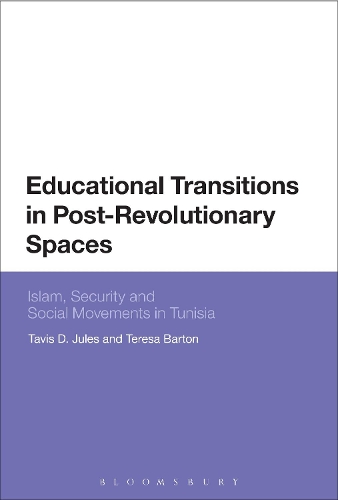
Educational Transitions in Post-Revolutionary Spaces: Islam, Security, and Social Movements in Tunisia
(Hardback)
Available Formats
Publishing Details
Educational Transitions in Post-Revolutionary Spaces: Islam, Security, and Social Movements in Tunisia
By (Author) Dr tavis d. jules
By (author) Dr Teresa Barton
Bloomsbury Publishing PLC
Bloomsbury Academic
22nd February 2018
22nd February 2018
United Kingdom
Classifications
Tertiary Education
Non Fiction
Social groups: religious groups and communities
Revolutions, uprisings, rebellions
379.611
Physical Properties
Hardback
232
Width 156mm, Height 234mm
499g
Description
Educational Transitions in Post-Revolutionary Spaces explores the transformation of the education system in Tunisia following the Jasmine Revolution, the first of a wave of revolutions known as the Arab Spring. The authors provide a detailed account of how Tunisias robust education system shaped and sparked the conflict as educated youth became disgruntled with their economic conditions. Exploring themes such as radicalization, gender, activism and social media, the chapters map out the steps occurring during transitions from authoritarian rule to democracy. Educational Transitions in Post-Revolutionary Spaces traces the origins of the conflict and revolution in societal issues, including unemployment, inequality and poverty, and explores how Islam and security influenced the transition. The book not only offers a thorough understanding of the role of youth in the revolution and how they were shaped by Tunisias educational system. Crucially, it provides a comprehensive understating of theoretical and methodological insights needed to study educational transitions in other post-revolutionary contexts.
Reviews
Jules and Barton provide a unique and insightful analysis of the role of education in social revolutions and the Arab Spring, exploring the unique intersections of religion, gender and politics. This volume extends our understanding of education and social change with its rich and multifaceted analysis. * Robin Shields, Senior Lecturer in Higher Education Management, University of Bath, UK *
Policy streams, imaginative regimes of hope, despair and resistance, research beyond the ubiquitous methodological nationalism that continues to dominate contextualized studies in education. These are some of the urgent and intriguing aspects of this timely book that will serve as an important contribution to understanding the current situation confronting youth and education as well as education research itself. * Stephen Carney, Associate Professor of Comparative Education, Roskilde University, Denmark *
Using a comparative-historical lens, Educational Transitions in Post-Revolutionary Spaces takes us through a fascinating journey of Tunisias 3000 years of state-run education under different authoritarian regimes. It convincingly argues that education played a critical role in mobilizing youth for political action and explains the complex trajectories that led young Tunisian revolutionaries to the streets to peacefully topple the Ben Ali regime. This is an entirely compelling and timely book. * Iveta Silova, Professor and Director of the Center for the Advanced Studies in Global Education, Arizona State University, USA *
Author Bio
Tavis D. Jules is Associate Professor of Cultural and Educational Policy Studies and International Higher Education at Loyola University Chicago, USA. Teresa Barton is a researcher and PhD candidate in the Cultural and Educational Policy Studies program at Loyola University Chicago, USA.
